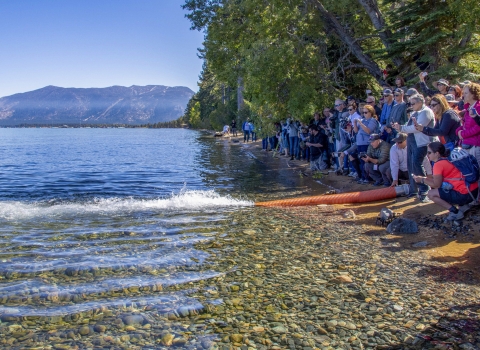WASHINGTON - The Department of the Interior today announced more than $40.6 million in grants through the U.S. Fish and Wildlife Service to 10 states and the U.S. Virgin Islands to support land acquisition and conservation planning projects on over 7,200 acres of habitat for 65 listed and at-risk species through the Cooperative Endangered Species Conservation Fund (CESCF). The grants help support the Biden-Harris administration’s America the Beautiful initiative, and will be matched by more than $17.6 million in partner funds.
“The Biden-Harris administration is committed to the success of America the Beautiful, which is focused on pursuing collaborative, inclusive and locally led approaches to voluntary conservation. Today’s funding announcement is another way in which we are honoring our promise to conserve and restore America’s lands and waters for the benefit of all,” said Secretary of the Interior Deb Haaland. “I appreciate the Service’s continued efforts to work hand in hand with states and private landowners to connect people with nature and conserve fish, wildlife and their habitats.”
“The Endangered Species Act continues to make a difference with funding through grants to state and territorial fish and wildlife agencies and their partners in the conservation of our nation’s most imperiled species and their habitats,” said Service Director Martha Williams. “The Service is pleased to continue to support these collaborative partnerships as we commemorate the 50th anniversary of the ESA.”
Today’s announcement comes as the Department honors the ESA’s 50th anniversary. Throughout the year, the Department is celebrating the ESA’s importance in preventing imperiled species extinction, promoting the recovery of wildlife and conserving the habitats upon which they depend. The ESA has been highly effective and credited with saving 99% of listed species from extinction. Thus far, more than 100 species of plants and animals have been delisted based on recovery or reclassified from endangered to threatened based on improved conservation status, and hundreds more species are stable or improving thanks to the collaborative actions of federal agencies; Tribal, state and local governments; conservation organizations and private citizens. Authorized by Section 6 of the Endangered Species Act and partly funded through the Land and Water Conservation Fund, CESCF grants contribute millions annually to support the implementation of state and territorial programs that conserve and recover federally listed and at-risk species on non-federal lands. This approach to conservation, done in cooperation with states, territories, willing landowners and local partners, furthers species conservation and facilitates compatible economic development.
CESCF land acquisition funding to states is awarded through two nationally competitive grant programs: the Recovery Land Acquisition Grant Program, which provides funds for the acquisition of habitat in support of Service-approved recovery plans, and the Habitat Conservation Plan Land Acquisition Grant Program, which provides funds to acquire habitat for listed and at-risk species to complement conservation strategies of approved HCPs. This year’s awards, totaling more than $36.6 million, will fund the acquisition and permanent protection for 10 projects over 7,200 acres of habitat across six states and one territory for the benefit of 32 listed and at-risk species.
The Service also approved more than $3.9 million in grant awards to five states under the Conservation Planning Assistance Grant Program. Funding awarded through this program may be used to support the development, renewal or amendment of voluntary landowner agreements, i.e., HCPs, safe harbor agreements and candidate conservation agreements with assurances. Eligible activities include document preparation, public outreach, baseline species surveys, habitat assessments, inventories and environmental compliance. This year’s awards will support six conservation planning efforts covering 39 listed, candidate and at-risk species.
For a full list of awards and to learn more about the CESCF grant programs, please visit the Service’s CESCF program page.



